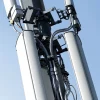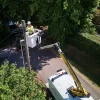Orbital Net (Vfast) Boss on 100Mbps Wireless Trial and Future Challenges
The boss of UK ISP Orbital Net (Vfast), Darren Brown, has today spoken to ISPreview.co.uk about how they’re testing a new 100Mbps service and his concern that fixed wireless broadband provision is “often overlooked by government“. Despite this he is happy to support the idea of a full fibre (FTTP) USO.
Orbital is a provider that has been around since all the way back in 1998, when ancient dial-up internet links ruled the roost. Today the Orbital Internet Group Ltd. consists of Orbital Net and Vfast. The former is a commercial ISP that provides fibre optic and fixed wireless connectivity, while the latter is a residential ISP that uses WiMAX technology to deliver broadband across Kent (plus some FTTP services in new build OFNL areas and VDSL2 / FTTC across the UK).
Historically the provider has focused on serving the county of Kent in England, although they also have some limited coverage in parts of East Sussex, Devon and Essex. “We have plans to expand out from those smaller networks but at the moment we are concentrating on upgrading our current network to give the best possible service to our existing customer base,” said Darren.
Advertisement
At present residential customers of the VFast wireless service are being offered download speeds of up to 24Mbps (average of 23.92Mbps) and uploads between 1 to 10Mbps. The cheapest package costs just £14.50 a month with a 5GB monthly data allowance and this rises to £36.99 for an unlimited service. Installation is typically £249 (one-off) on a 12 month contract or £199 for 24 months and all packages include a wireless router.
However Darren states that they’re currently conducting customer trials of a new ultrafast 100Mbps service in a “few areas” and in theory their new equipment could one day push this to 1Gbps, although they have yet to announce the 100Mbps service as an available product to all “but we are looking to roll out faster speeds across the board.”
“We are now in our twentieth year of building and maintaining broadband networks and the future is more exciting than ever with the technology improving at a rate faster than ever before,” said Darren. Despite this he is frustrated that “wireless provision is often overlooked by government … [they] should focus on the end result for the customer and not the technology used to deliver“.
One of the reasons why wireless connectivity has started to drift more into the background is because of the increasing focus on multi-Gigabit capable Fibre-to-the-Premises (FTTP) infrastructure. In 2018 the government announced that it wanted to see this covering the whole of the UK by 2033, although they’ve yet to set out how that would be funded in rural areas.
Advertisement
You might think this would be a threat to Vfast but instead Darren told ISPreview.co.uk that he still supported the idea of a full fibre based Universal Service Obligation (USO), provided enough time was allowed to deploy it and more sharing of existing infrastructure is allowed. “Digging up the road over and over benefits nobody but the civil contractors … for FTTH [we need] a model for shared infrastructure that works for all.”
Check out our full interview below for more.
The Interview
1. We recall from a few years ago that vfast (Orbital Net) used a fixed wireless broadband network that’s based off the now somewhat aged WiMax technology. Is this still the case and can you tell us a little bit about what spectrum bands you use?
ANSWER:
Vfast is always evolving with its wireless technology and wherever practical, repeater sites are now fed using fibre rather than wireless backhaul. Core repeater sites are dual fed diversely, by fibre and wireless failover.
In areas where a fibre feed is not viable, we use a mix of licenced spectrum which means we are able to offer an interference free operation. Some bands used for this are 13Ghz and 18Ghz.
As you can see the network is a mix of different technologies, many of our networks that operate in the 5ghz band are able to take advantage of now running AC technology to provide more capacity from each transmitter. This allows many of our customers to reap the benefit of reliably faster speeds and lower latency.
2. At present the fastest download speeds being offered by vfast’s consumer wireless broadband packages seems to be 24Mbps download (10Mbps upload). Do you have any plans to improve upon this for all of your customers and, if so, can you tell us how much faster the service might go or what new technologies you might adopt (5G etc.)?
Advertisement
ANSWER:
Based on the proposed Ofcom changes of 57-66Ghz and 66–71 Ghz with the possibility to provide P2MP connections, we are evaluating various manufacturers and trailing equipment that is capable of delivering 1Gbit to the end user. How this will perform in a situation of multiple clients, we are yet to find out but the Technology is evolving fast and we are excited for the outcome.
Over the last three years we have been investing heavily upgrading our network in the background where our objective is to provide higher speeds to our users. We are already successfully delivering a trial 100Mbit connection in a few areas. We have not announced this as an available product to all but we are looking to roll out faster speeds across the board.
3. Generally vfast are best known for their wireless network coverage of Kent in England. Are there any plans to expand the coverage into other parts of the UK over the next 5 years?
ANSWER:
Vfast is of course predominantly a Kent based network, we do however serve some parts of East Sussex, Devon and Essex. We have plans to expand out from those smaller networks but at the moment we are concentrating on upgrading our current network to give the best possible service to our existing customer base.
4. Over the past 2-3 years the focus on broadband connectivity in the United Kingdom has increasingly become centralised around Gigabit capable “full fibre” (FTTH/P) technologies, which is something that we’re going to touch on quite a lot today.
However this focus on pure fibre optic lines must also be a little bit frustrating for wireless providers, which can be well suited to catering for premises in digitally isolated areas (especially rural locations).
Do you agree that fixed wireless ISP solutions are being overlooked by the government and, if so, how would you go about changing their approach?
ANSWER:
I think Wireless provision is often overlooked by government, I think the main issue is people are focused on headline speeds. We use a mix of technology including fibre to suit the particular situation. I think the Government should focus on the end result for the customer and not the technology used to deliver, after all, the end user experience is the important bit which is why as a Company, we will deploy whichever technology best suits the customer requirements.
5. With so many ISPs planning to deploy FTTH/P connectivity into urban areas, the prospect of a significant overbuild will rise. In some areas we might potentially see several FTTH/P providers, which is good for consumer choice but might not improve overall coverage and may frustrate locals if their streets are being dug up multiple times by different operators.
What approach do you think should be taken to this or is it more a matter for natural competition and potentially even future market consolidation to sort out?
ANSWER:
Digging up the road over and over benefits nobody but the civil contractors. We don’t do it for water, gas or electricity supply. What we need for FTTH is a model for shared infrastructure that works for all stakeholders. The right answer probably sits somewhere between duct sharing and dark fibre.
Duct sharing is the politically easiest solution, and solves the residents concern on disruption, but a step up to municipal dark fibre (a la Stokab) would reduce the barrier to entry to the market for competition, which would be a good thing. Perhaps rather than the Government funding broadband rollout, fund government owned duct installations that are shared by the providers who would come with their own investment.
Continued on page 2..
Mark is a professional technology writer, IT consultant and computer engineer from Dorset (England), he also founded ISPreview in 1999 and enjoys analysing the latest telecoms and broadband developments. Find me on X (Twitter), Mastodon, Facebook, BlueSky, Threads.net and Linkedin.
« Progress Update on the Broadband Voucher Schemes in Wales
















































Comments are closed